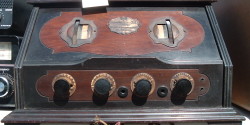Today REC Networks announced that it has begun work on the REC Radio History Project. It has started to mine the FCC database for historic AM station information and will be adding that material to the REC Broadcast Query tool. So far, it’s added information related to Los Angeles stations KFI and KHJ. According to REC,
Prior to 1979 and going back to the 1920s, all broadcast license records were typed on 3 x 5 index cards and kept in a card catalog. These cards maintained a basic history of the station including every application that was placed and their outcome. When the FCC moved their offices to the Portals in 1999, the 3 x 5 cards were transferred to microfilm and eventually destroyed. The FCC has made the History Cards accessible to the general public.
REC has set up several database tables that would permit information from these history cards to be transferred to the database and be displayed with the automated records from CDBS in the REC Broadcast Query tool (recnet.net). The REC Broadcast Query now supports the history card database for AM stations. If you look at the Broadcast Query records for KFI or KHJ in Los Angeles, you will see the updated Broadcast Query result for these stations which now includes application data going back to the 1920s.”
REC notes that records are incomplete and that “Some items such as renewals and information about auxiliiary facilities are not recorded.” In order to make its way through the vast amount of information housed in these history cards, REC is seeking volunteers who would be interested in working on culling details for stations in a given metro market. REC writes, “Not only would this help others who wish to research these stations but it is an excellent learning experience in the history of broadcast radio in your area.”
REC plans to work on Los Angeles-area stations first, followed by New York and Chicago. If you have an interest in helping with this project, REC Networks can be contacted through its website. REC estimates that compiling station information will potentially take about two hours for each station.



